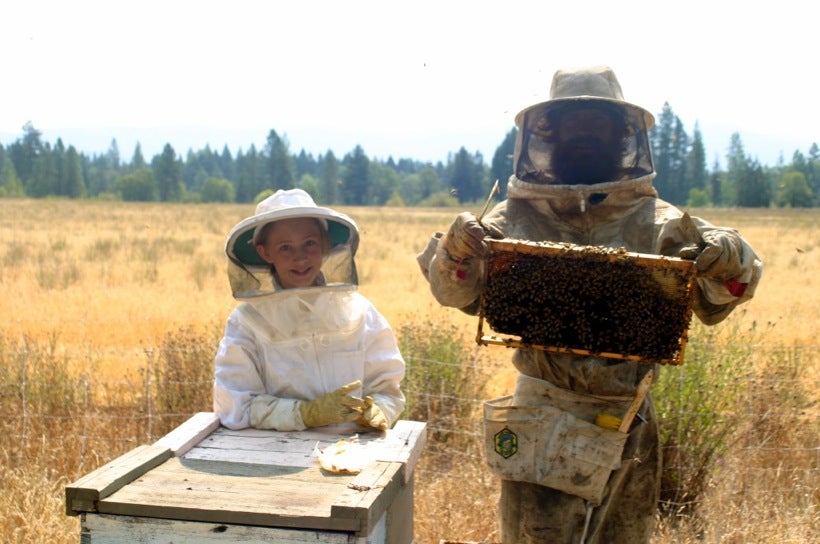Blocking Pesticides From the Beehive
Concerned citizens in Josephine County, Oregon, waged a successful fight to limit pesticide use within their borders, protecting bees in the process.

This page was published 11 years ago. Find the latest on Earthjustice’s work.
With the plight of the honeybee receiving much national attention lately, I checked up on an old friend of mine who is a beekeeper in Josephine County, Oregon. I intended to write about how her bees were faring, but once I heard her story, I quickly realized this post wasn’t going to be only about the perils of these bees. There is a much more compelling tale here—one of a heartfelt and courageous grassroots environmental movement initiated by the concerned citizens of this unique Southern Oregon community.
Joy McEwen and her husband Eric operate a farm and apiary in Cave Junction, where they have practiced organic agricultural standards for 13 years. They live amid the Siskiyou Forest, scenic waterways of the Illinois and Rogue Rivers, rare plants, and woodlands rich with wildlife. It's the perfect landscape to do what they love—beekeeping—while raising their three young daughters. Yet, like many other apiaries across the country, their hives are imperiled by Colony Collapse Disorder caused by pesticides—despite the McEwen’s organic farming practices.
Government entities and corporations recklessly spray pesticides in the name of road maintenance and logging, repeatedly exposing the entire region to harmful chemicals. They spray compounds that include atrazine (often discovered in drinking water), glyphosate (found in Monsanto’s Roundup), and 2,4-D (a highly toxic chemical found in Agent Orange), which are considered “restricted use pesticides”. Pesticides with this label can only be applied by or under the direct supervision of specially trained and certified applicators through the EPA and state agencies.
It’s no surprise then that pesticide use in this community is a direct threat to Joy's and Eric’s livelihood. It’s not just their honeybees and farm at risk, or their longstanding goal to one day certify their farm and apiary as organic through the USDA. It’s about protecting the health and wellness of their family and fellow residents, the food they grow and produce for their community, and this rich, bio-diverse land they call home.
The McEwen’s and their fellow residents have become increasingly concerned and even agitated over the health and safety of their community in recent years, recognizing that just as pesticides pose an imminent threat, so do genetically engineered crops (known as GMOs). Particularly in this lush environment, a premier seed-growing region for many crops, GMOs threaten the purity of seeds and plants, soil and water, and the future sustainability of the land.
The people of Josephine County banded together to shed light on the harmful practices of spraying pesticides and planting GMOs, but their elected officials and government agencies told them repeatedly that current laws allowed these practices. Undeterred, this group of concerned citizens took to the law to advocate for change. The McEwen’s, along with local businesses and fellow community members, formed a coalition called GMO Free Josephine County. Through grassroots movements and political prowess, they drafted a measure opposing GMOs in their region, procuring support for the initiative along the way. The coalition successfully petitioned to have the Genetically Engineered Plant Ordinance added to the May 2014 electoral ballot. Strong opposition from wealthy industry groups stood between the residents and their endeavor to ban GMOs, but the coalition was determined and raised awareness throughout the community. Their efforts paid off. The measure passed by a vote of 58 percent, effectively banning GMOs in the entire county.
Joy, Eric and their fellow community members have truly shown ingenuity and strength in standing up for the health of their community. Their efforts are a shining example of how positive outcomes are possible in the often-treacherous fight against toxic chemicals and genetically engineered crops.